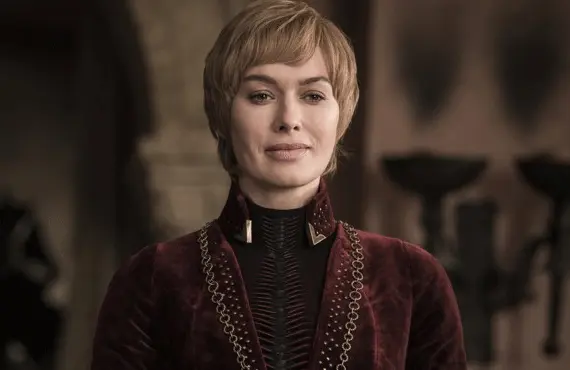Game of Thrones: Cersei Lannister Went Out with a Literal Whimper
-
 Lena Headey as Cersei in Game of Thrones (HBO)
Lena Headey as Cersei in Game of Thrones (HBO)The penultimate episode of Game of Thrones was 82 minutes of some hard-to-watch stuff. There was the brutal, bloody violence as Daenerys's forces massacred the population of King's Landing — men, women, and children — while Dany and Drogon rained hell from above, all quite problematically since the soldiers and citizens in the Westerosi capital had already rung the big tower bell of surrender. To the extreme chagrin of Tyrion, Jon Snow, and Arya Stark, the Dragon Queen went full Targaryen, torching a path to the Red Keep and leaving the entire city in smoking ruins. Expect one final showdown next week.
But attention should be paid to the foundational character we lost this week. Quite a few people bit the dust in this episode, actually. Lord Varys paid dearly for his attempts to drum up a palace coup, and now we'll never learn just what the voice in the fire said to the warlock who castrated him. Horny pirate Euron Greyjoy got chased from his ship and then bested by Jaime in a cove brawl. Qyburn the pyromancer met a rather unspectacular end, shoved skull-first into a wall by the Mountain. And, speaking of which, eight seasons of anticipation led to us finally getting Sandor the Hound and Gregor the Mountain facing off in Clegane Bowl, which … ended in a tie. But it's the sad death of the incestuous Lannister twins Jaime and Cersei that hit the hardest. In particular, Cersei's frightened, whimpering end was nowhere near where a lot of us figured she'd meet her end.
Predictions ran the gamut, but most figured that a rampaging Cersei would be felled by either Arya or Jaime, with an outside shot going to Dany herself (queen vs. queen!). Instead, Cersei watched helplessly as King's Landing burned — in a moment that felt very intentionally twinned with the scene where she watched the Sept of Baelor explode into green wildfire at the end of season 6 — and the Red Keep came crashing down around her. After fleeing to the crypts, Cersei and Jaime have a surprisingly sweet, vulnerable moment together, where they affirm their love for each other and then die more or less unspectacularly under a crush of stone walls.
This end for Cersei couldn't help but feel jarring after last week's show of supreme villainy in beheading Missandei. It's not like Cersei hasn't always been the bad guy, but last week felt beyond the pale, and it would have to be up to one of our heroes to do something about it. But what was lost in spectacle for Cersei's death was made up for in symmetry. Because way back in season 2, the last time Cersei needed to duck into hiding in the hopes that she would survive the sacking of King's Landing, was the moment that Game of Thrones had succeeded in making Cersei the show's most satisfyingly complex character.
Throughout the first season of Game of Thrones, Cersei is scrambling to hold onto power while Ned Stark noses around proof that her children are Jaime's and not Robert's. She manages to hold onto that power by murdering Robert and arranging for the execution of Ned Stark. She is every bit the wicked queen, even if it's young Joffrey who sits on the throne. Season 2 features a lot of Cersei sneering at her brother, Tyrion, which was not exactly a fast track to audience approval. But it was via her relationship with Sansa that the audience got a window into Cersei's complicated relationship with power. Sansa would later say that, while she and Cersei were not friendly, she ended up learning a lot from Cersei about acquiring and wielding power from a position of disadvantage.
The night of the Battle of Blackwater, Cersei drank a lot of wine and waited to hear of the tide of battle, knowing that if Stannis's forces prevailed, she'd need to quickly poison herself and her children (Myrcella and Tommen, of all sad ironies) to keep them from getting captured and subject to a worse fate. It all made Cersei seem so human and her murderous attempts to hold onto her power seem almost rational.
Sunday night, at the end, Cersei finally got the news that she'd been dreading during the Blackwater. This time, with no children to keep safe and no kingdom to fight for, Cersei did what she so rarely had done: she broke down. No need for Arya the assassin to leap out of the darkness at her. No need for Dany to command "dracaris" and set her ablaze. Cersei Lannister spent the bulk of her life imprisoned inside that Red Keep, locked into a power dynamic that, if she ever lost it, it would mean her death. Finally, those stone walls became her tomb. No doubt it would come as the coldest of comfort to Cersei to know that the little dove she quasi-mentored so many years ago might be best positioned to take the Dragon Queen down. But that's for next week.
For more Game of Thrones, join the conversation in our forums.
Joe Reid is the senior writer at Primetimer and co-host of the This Had Oscar Buzz podcast. His work has appeared in Decider, NPR, HuffPost, The Atlantic, Slate, Polygon, Vanity Fair, Vulture, The A.V. Club and more.
TOPICS: Game of Thrones, HBO, Lena Headey
- What is Sophie Turner hinting at with her cryptic message about “endings and beginnings”?
- HBO confirms a new Game of Thrones sequel series, with more projects now in development
- House of the Dragon season 3 eyes June after confirming Summer 2026 premiere
- Only Sansa Stark's character development makes sense during the Game of Thrones ending